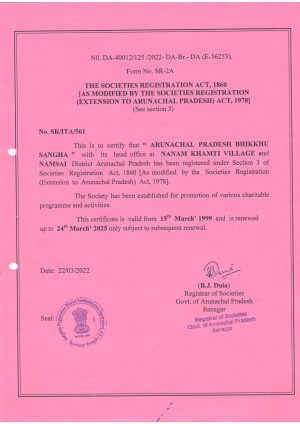Organization
Home | Organization
Bye Laws | Estd : 1972
INTRODUCTION
It is truism that the Buddha's teaching have been resounding
the last 25th centuries. During his lifetime he organized, conducted and guided the
'sangha' and 'Viharas' according to rules and constitutions of the various 'Sangha'
himself as a prince, had well- adopted all- round wisdom in running institutions
according to the rules of laws laid down by principles and constitutions of the
Dhamma for many decades during his lifetime. He solved various problems that
arose in the working of the order of monks. His teachings, rules and constitutions
are preserved in the sacred text called the Tripitaka, for the guidance of monks and
lay Buddhist.
From time to time healthy changes were incorporated in the procedure
without forgetting the main principles. The appealing and persuasive force of his
principles is based on time and space transiently.
A great man envisaged the universal truth with which nothing can be altered at
any time and place. A small change in the procedure shows the elasticity of the
rule.
There are places where lay Buddhist and monks are at different rungs of the
ladder of self-realization, occasion arises when regional insistence sometimes
obliterates the main aim. In such circumstances active endeavours become needs
of the hour in order to correct the direction and bring the order back on an even
keel. Buddhist history is full of such stocks taking, re-adjustment and revision. The
senior monks have acted as beak on light to show the correct path. lt is well to
recall that a few weeks after Buddha's 'nirvana' the first council was held at
Rajgriha in about 487 B.C.lt was attended by 500 monks from various 'Sanghas'. A
second council was held after 100 years in 387 B.C. to correct the monk's of Vaishali who
had stayed from the rules of 'Vinayapitika'. A third council was held at Pataliputra
during the reign of Ashoka, presided by Moggaliputta Tissa Mahathero to eliminate
disruptive tendencies and to make clearance within the order this was punishable.
The fourth council was held in Kashmir under Vasumitra and Asvaghosha during
the reign of Kaniska. lt settled down certain controversies.
The above enumeration of councils will serve a purpose if it reminds the order
monks for corrective measures are needed from time to time. Besides the central
council, it has been ordered recorded that all local differences were settled by a
body of senior monks. Such a need has arisen today in the northeast, lndia. lt has
been observed that the solidarity, cohesion of a purposeful sense is missing in the junior rank of the order, each and every monk is ordinated in respected of
antecedents of the person ordinated. Small motive has been made a cause of
controversy and is used to flout the great principles so much so that some place
have become a laughing stock for the entire sundry. The present constitution of
is drawn to correct such practices and maintain the right order of Sangha.
DIRECTIVE PRINCIPLES
- That there is nothing contrary to what had been laid down in the 'Vinaya Pitika' or the law of the land.
- That the international character of the Dhamma shall be the guide of the order. That the challenges and demands of the present time are met fully.
- That discipline, scholarship, the greatest good of the greatest number is the guiding principle.
- That all monks abide by the present constitution and identity themselves as such that political activity is kept at a distance.


